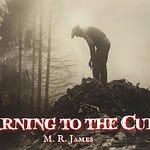Sarah Orne Jewett
This episode is a real treat for me for a number of reasons. One is that this was my first commission! Susan Foust very kindly introduced me to this story and even paid me to read it out. Win-win-win. If you would like a commission, it would be remiss of me not to point out, you can get me to read any story under 10,000 words here.
So back to Sarah Orne Jewett. She lived her life on the southern coast of Maine in New England. She was born in 1849 in South Berwick and died in 1909 aged only 59 in the same year. She wrote a few collections of short stories, the most famous of which is The Country of Pointed Firs and you can get all of her work for free via the marvellous Project Gutenburg.
Her family were Mainers going a long way back. The family home was built in 1774. Her father was a doctor who specialised in obstetrics and gynaecology. Her mother suffered from rheumatoid arthritis so the young Sarah spent many hours walking in the local countryside. She often visited Boston but her stories feature the small towns she was familiar with, even when she disguises their names.
She had an interested in the Swedish mystic Swedenborg and she believed, apparently in Divine immanence: that god is in all things, though she was a firm believer in individual responsibility, which I always imagine as being a big thing in New England.
I am struck by how different her New England is to that of Lovecraft of even of Russell Kirk whose Behind The Stumps we read out ages ago. I must do more of his stuff. I must do more of lots of people's stuff: there are outstanding calls for more Poe, which I will get to.
Sarah Orne Jewett published her first story aged only 19 and her reputation grew in the 1870s and 1890s. People commented that her stories were driven by a focus on local colour more than plot, but I think Lady Ferry has an interesting, if gentle plot.
She never married a man but had a close friendship with a married woman and the woman's husband and when the husband, a publisher died, the two women moved in together. Of course this was a time when certain types of love were not allowed to speak their name.
They travelled together through America and Europe until in 1902 she had a carriage accident which ended her writing career. This was compounded when she had a stroke in March 1909 and she died soon after.
Lady Ferry
This is a delightful story and I am grateful to Susan Foust for bringing it to my attention. We see everything through the eyes of a young girl and the mystery is framed by her youth and her maturity as later she comes back to satisfy her curiosity.
It appears to be a supernatural story but is very subtle. Lady Ferry haunts the garden as a ghost, but she is corporeal though no one knows her origin. It is hinted that she cannot die and that she is ancient. For example from the dresses she wears taken from the original builder of the house's chest at least a century or more earlier, by the fact she claims to have known Marie Antoinette and the grandfather of Mr McAllister. This puts her origin well back into the 18th Century. And she must have been born at least in 1750 if not earlier. She also references The Spanish Main, which might even suggest memories of the 17th Century.
But this is explained away by her wandering mind. These are just fancies, surely? But there are a number of gothic touches which throw doubt on this. Firstly the visitors who come for the ball in the middle of the night. Though this is just a dream, surely? But then the boats are missing. I loved the funeral arrangement and I loved the descriptions of meeting Lady Ferry in the garden when the glowers glow in the gloom. Fantastic stuff.
The book that might have solved the mystery is tantalisingly lost as it falls through the floorboards, only to be found again many years later.
Our heroine returns to find the house desolate and Lady Ferry at last in the graveyard. So it seems that she can die. Throughout the story we are kept in suspense: is she a supernatural creature, albeit cursed like the Flying Dutchman or the Wandering Jew, (and the Comte de St Germain comes to mind though he isn't mentioned as I recall)? Or is she mortal?
For me the last words "she is dead" seem poignant and regretful. All the childish wonder that such things might exist is regretfully extinguished. The world is ordinary and everyone dies and I catch a hint that she hoped it was not so: she hoped that Lady Ferry still lived and if she still lived then all the magical memories of that summer, and by extension of childhood, were really enchanted.
Readers, why do we linger with stories like this? Because we want to re-enchant our world. We don't want to live in the dead machine of modern materialism, we want to live in a world where ghosts walk and magic is real.
Notes on My Accent
Yes, I decided it had to be done American. I watched Youtube videos on the east coast Maine accent and its lack of rhoticity. I attempt to do that with the servants voice, but the problem is me missing off American rs just sounds like I'm lapsing into British English. Fire is fiurr or fiah. It needs work, but I hope my attempts didn't detract too much from the story.














S02E30 Lady Ferry by Sarah Orne Jewett